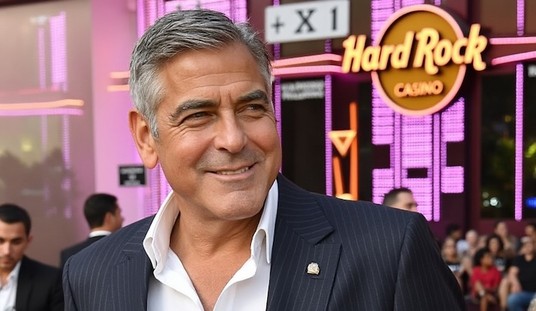Remember that quaint old notion called “responsibility”? It’s hit a patch of rough times. As problems and costs and scandals pile up in the shadow of the expanding American nanny state, as horrors mount in a world bereft of American strategic vision and leadership, it happens far too often that the buck stops nowhere. Instead, as far as our political elite are inclined to offer anything even resembling accountability, what we hear far too often these days is a phrase that has been hijacked as the ultimate non-apology: “I take responsibility.”
How many times in recent years have you heard that phrase on the news, uttered from some pinnacle of power — “I take responsibility” — and wondered what on earth it really means? What are the consequences of taking this ever more amorphous thing called responsibility?
Not that this vacuity of word and deed is confined to American politics. If anything, Washington has increasingly imbibed techniques perfected years ago by the likes of the United Nations, an outfit devoted to seeking control over everything in its path while taking genuine responsibility for almost nothing.
A classic of this genre is the record of former UN Secretary-General Kofi Annan, who in an earlier UN post, as head of peacekeeping, in 1994, deflected the dire warning of the UN peacekeeping commander in Rwanda, General Romeo Dallaire, that genocide was imminent. Instead of acting to try to avert the slaughter, Annan’s office ordered the peacekeepers to stand aside, and Annan failed to notify the Security Council. Years later, referring to the UN’s passive “neutrality” when warned of the impending Rwandan genocide, Annan said “I take responsibility” (though he also implied that the fault lay with his subordinates, not with himself). But did he really take responsibility? Not a jot. In Rwanda, some 800,000 men, women and children were slaughtered. In New York, two years later, Annan was promoted to secretary-general.
It gets depressing listening to this sort of thing. Genuine responsibility is one of the vital underpinnings of a free society, and when responsibility-taking is devalued into a empty ritual, we are all in trouble.
What a relief, then — both humbling and inspiring — to spend an evening, as I had the privilege of doing this past Saturday, in the company of people for whom “taking responsibility” is not some sort of post-modern excuse for failure, but a code of heroes.
I’m referring here to a blacktie dinner held in Washington this past Saturday by the American Veterans Center, honoring some of America’s warriors for feats of staggering responsibility — and courage. There were many there, all with incredible stories. There were heroes on hand who fought in World War II, in the Korean War, in Vietnam, in Iraq, in Afghanistan. Details of the ceremony, and a roster of this year’s honorees, and clips from last year, can be found on the AVC site.
To be in such company is overwhelming. There is no way to summarize what these people have done — though it would be a good start to browse the roster of winners of the Medal of Honor, and then go on to honor many of those who sat unnamed in the audience at that dinner, heroes in their own right.
But let us focus on one of the honorees: retired Marine Corps Corporal Hershel “Woody” Williams, who served in World War II. He is one of 27 men who received the Medal of Honor for valor on Iwo Jima, which, as the program told us, was the only battle in which American casualties exceeded those of the Japanese. Facing a heavily dug-in enemy, the Marines fought for every inch.
Here’s an excerpt from the AVC program, describing the actions of Woody Williams — then a young Marine from West Virginia, trained in demolition and the use of flame-throwers — as the Marines fought to take Mount Suribachi, where, as immortalized in the Marine Corps War Memorial, they would raise the Stars and Stripes:
Not far from the mountain base, several American tanks advanced slowly through the black volcanic sands. Suddenly, they hit a network of reinforced concrete pillboxes and buried mines. They were trapped in the kill zone.
Behind the tanks was the young Marine corporal, Woody Williams. Knowing his comrades were now an easy target, he quickly set forward toward the enemy positions — armed only with his 70 pound flamethrower.
With limited cover from four Marine riflemen, Williams fought his way forward, blasting pillbox after pillbox with his flamethrower…. Marines watched in awe as the young West Virginian, once turned away from the military for being too short, took complete control of the battlefield. He was one man, in one moment, changing the course of an action during one of the toughest battles of the war.
That’s how Woody Williams took responsibility.
Williams is now 92 years old, the last surviving Medal of Honor winner who fought on Iwo Jima. You can read more about him here. I had the honor of chatting with him briefly, when I went over to his table to ask him to autograph the evening’s program for two young men I know who are now learning, in their own ways, the meaning of responsibility — both are patriots, and one is a young Marine. Williams is full of life, plain-spoken and took the trouble to crack a joke while signing dedications to the next generation.
When he stepped onto the stage to receive the AVC’s Audie Murphy Award this past Saturday evening, Williams did not talk about his own heroism. He talked about his brothers-in-arms, the Marines with whom he served on Iwo Jima — the responsibilities they took, and at such great cost they honored.









Join the conversation as a VIP Member